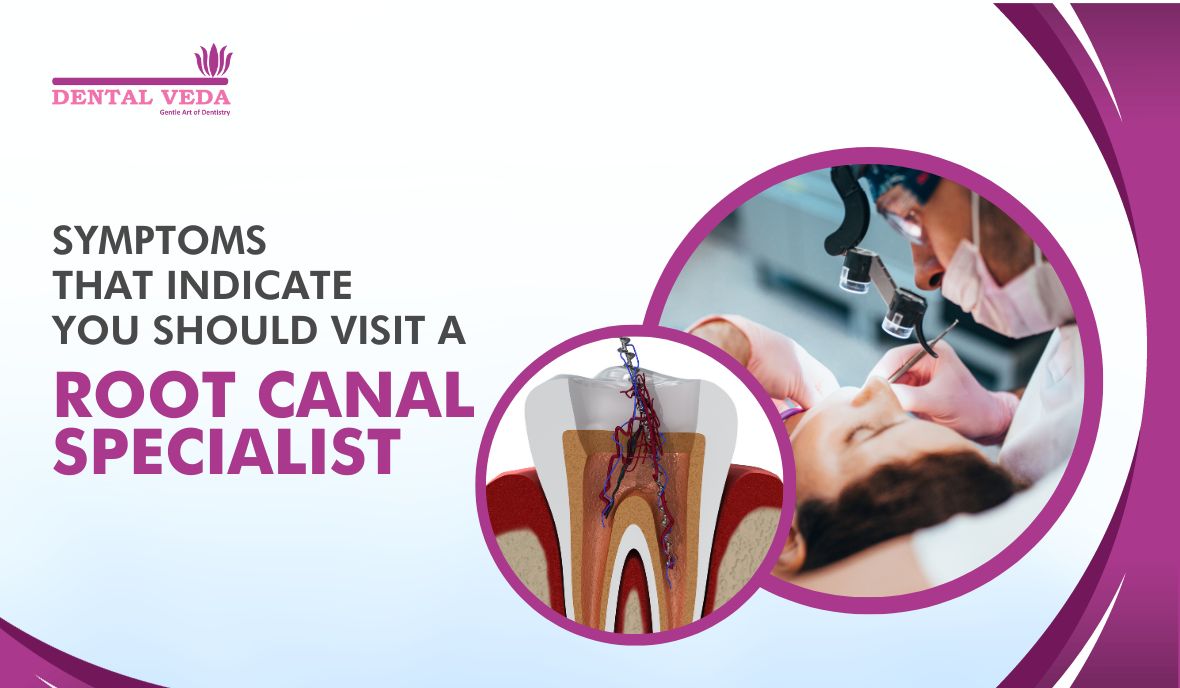Root canal treatment, often simply referred to as a “root canal,” is a dental procedure designed to save and restore a damaged tooth. Within each tooth is a network of tiny canals containing dental pulp, consisting of nerves, blood vessels, and connective tissue. When this pulp becomes infected or inflamed due to deep cavities, cracks, or trauma, it can cause excruciating pain and potentially lead to tooth loss.
Root canal treatment involves the removal of the infected or damaged pulp from the tooth’s interior, followed by a thorough cleaning and disinfection of the canal. Afterward, the tooth is sealed with a filling or crown to prevent further infection and restore its strength and functionality.
Importance of recognizing symptoms
Recognizing the symptoms that may necessitate a visit to a root canal specialist is crucial for several reasons. First and foremost, early detection and intervention can save your natural tooth, preventing the need for extraction guides like implants vs bridges. Preserving your natural teeth is cost-effective and vital for maintaining proper oral function and aesthetics.
Furthermore, untreated dental infections can lead to serious health complications beyond the oral cavity. Infections can spread to the surrounding tissues of the jawbone or even enter the bloodstream, posing a risk to your overall health.
Some Common Symptoms
-
Pain and Discomfort:
-
Persistent Toothache:
One of the most telltale signs is a persistent, throbbing toothache that won’t go away. It’s like a relentless drumbeat of discomfort, often disrupting your daily life.
-
Pain while Chewing or Applying Pressure:
When you experience sharp pain while biting down on food or applying pressure to the affected tooth, it’s a clear indication that something is amiss.
-
Sensitivity to Hot and Cold Temperatures:
Feeling a sudden, shooting pain when you sip a hot beverage or enjoy a scoop of ice cream can be a sign that the nerves inside your tooth are unhappy.
-
Gum and Facial Swelling:
-
Swollen Gums Around the Affected Tooth:
Swelling in the gums surrounding a specific tooth can indicate trouble. Your gums might appear red and swollen, making it uncomfortable to touch.
-
Facial Swelling or Tenderness:
Sometimes, the issue can escalate to the point where your face starts to swell or feels tender to the touch. This is a red flag that shouldn’t be ignored.
-
Pimple on the Gums:
-
Formation of a Pimple-like Bump on the Gums Near the Tooth:
Imagine a small, pimple-like bump on your gums near the problematic tooth. This bump, known as a dental abscess, can be filled with pus and indicates an infection.
-
Pus Drainage from the Bump:
If you notice any drainage from this bump, which often has an unpleasant taste, it’s a clear sign that something is seriously wrong beneath the surface.
-
Discoloration of the Tooth:
-
Darkening or Grayish Discoloration of the Affected Tooth:
Your teeth should maintain a healthy, consistent color. If you spot a tooth that has noticeably darkened or turned grayish, it’s a visual cue that the pulp inside may be compromised.
-
Change in Tooth Color Over Time:
Sometimes, the change in tooth color can be gradual, so it’s essential to pay attention to any alterations in the appearance of your teeth.
-
Prolonged Sensitivity:
-
Continued Tooth Sensitivity After Exposure to Hot or Cold:
While minor tooth sensitivity is common, if your tooth remains overly sensitive to temperature changes long after the stimuli are gone, it could indicate an issue deep within the tooth.
-
Sensitivity that Lingers for an Extended Period:
Normally, tooth sensitivity should subside relatively quickly. If it persists for an extended period, it’s a sign that you should seek professional dental care.
Remember that these symptoms are your body’s way of signaling that something isn’t quite right. If you experience any of these signs, it’s essential to consult a root canal specialist promptly to assess and address the issue, potentially saving your tooth and relieving your discomfort.
Symptoms Indicating an Advanced Infection
-
Severe Pain and Swelling:
-
Intense and Continuous Toothache:
Picture a relentless, stabbing pain that feels like a jackhammer in your mouth. An intense and continuous toothache is your body’s way of screaming for help, signaling that the infection has progressed.
-
Swelling Spreading to the Face or Neck:
When the swelling around your tooth starts spreading to your face or neck, it’s like an unwelcome houseguest overstaying their welcome. It’s not just localized discomfort anymore; it’s a red flag that the infection may be spreading.
-
Fever and General Malaise:
-
Elevated Body Temperature:
Feeling feverish is your body’s response to an infection that has gotten out of control. It’s like a warning siren urging you to seek immediate attention.
-
General Feelings of Illness or Malaise:
Imagine the sensation of being unwell, even beyond the discomfort in your mouth. You might feel fatigued, achy, or just plain lousy. These general feelings of malaise often accompany an advanced dental infection.
-
Difficulty in Opening the Mouth:
-
Limited Jaw Movement Due to Pain:
Imagine trying to open your mouth, but it’s as if an invisible force is holding it shut. Limited jaw movement due to pain is a clear indication that the infection has reached a critical stage.
-
Difficulty in Fully Opening or Closing the Mouth:
The simple act of opening or closing your mouth becomes a battle with discomfort. This difficulty is a sign that the infection is causing significant inflammation and pain.
-
Drainage of Foul-Tasting Fluid:
-
Foul-Tasting Fluid or Pus Drainage from the Affected Area:
Visualize a foul-tasting, unpleasant fluid oozing from the affected area in your mouth. This drainage often carries a pungent odor and is a definitive sign of a serious dental abscess.
-
Unpleasant Taste in the Mouth:
The taste in your mouth turns from the usual to something repulsive. This unpleasant taste is a result of the infection and drainage, and it’s a clear signal that immediate intervention is necessary.
These symptoms are your body’s way of issuing an urgent SOS. An advanced dental infection is not to be taken lightly, as it can have serious consequences if left untreated. If you experience any of these signs, don’t hesitate to seek immediate dental care to address the infection, alleviate your discomfort, and prevent further complications.
When to Seek Immediate Dental Care
-
Red Flags:
-
Experiencing Multiple Severe Symptoms:
Picture this: you’re dealing with an intense toothache, facial swelling, difficulty opening your mouth, and the taste of foul-tasting fluid in your mouth all at once. When you’re hit with a combination of these severe symptoms, it’s like a chorus of alarms going off. This is your body’s way of saying, “It’s an emergency. Act now.”
-
Symptoms Indicating a Dental Emergency:
Some symptoms should never be ignored. If you’re experiencing any of these, it’s like a flashing neon sign that reads “Dental Emergency.” These include uncontrolled bleeding, a knocked-out tooth, or an injury that has fractured your tooth.
-
Importance of Prompt Treatment:
-
Preventing the Spread of Infection:
Picture an infection as a wildfire. The sooner you address it, the better your chances of containing it. Prompt dental treatment can stop the infection from spreading to other parts of your mouth, face, or even your bloodstream.
-
Avoiding Potential Complications:
Think of dental infections as potential ticking time bombs. If left untreated, they can lead to complications like severe abscesses, bone loss, and systemic infections. Seeking immediate care is like defusing that bomb before it detonates.
-
Contacting a Root Canal Specialist:
-
How to Schedule an Appointment:
Making that call is your lifeline. You can schedule an appointment with a root canal specialist through your regular dentist or by finding a specialist directly. It’s like dialing 911 for your dental health.
-
Seeking Professional Evaluation and Diagnosis:
Imagine your tooth as a complex puzzle, and symptoms are the clues. A root canal specialist is like the detective who puts it all together. Seeking professional evaluation and diagnosis ensures you get the right treatment plan tailored to your specific needs.
Conclusion
Recognizing these symptoms promptly isn’t just about seeking relief from discomfort; it’s about preserving your oral health. Early intervention can prevent infections from escalating and causing more significant issues.
Moreover, regular dental check-ups play a crucial role in spotting potential problems before they become emergencies. Don’t wait for symptoms to escalate – schedule those routine visits to keep your oral health in check.
Looking for laser root canal treatment in Gurgaon? Well, look no further and book an appointment with us today.
Frequently Asked Questions
What is a root canal specialist, and when should I see one?
A root canal specialist, or endodontist, is a dentist with specialized training in diagnosing and treating issues related to the pulp inside your teeth. You should see one if you experience persistent toothaches, facial swelling, or other symptoms indicative of tooth infection.
What common symptoms suggest I might need a root canal treatment?
Common symptoms include persistent toothaches, sensitivity to hot and cold temperatures, swelling of the gums, or the formation of a pimple-like bump on the gums near the affected tooth. These can be signs of infection or damage to the tooth's pulp.
How do I know if I'm experiencing a dental emergency?
Dental emergencies often involve severe pain, uncontrolled bleeding, knocked-out teeth, or facial swelling. If you're unsure, it's best to seek immediate dental care to assess your situation.
Why is it important to address dental symptoms promptly?
Prompt attention to dental symptoms is essential because it can prevent infection, reduce the risk of complications, and save your natural tooth. Delaying treatment can lead to more extensive and expensive procedures.
What can I expect during a root canal treatment?
During a root canal treatment, the endodontist will remove the infected or damaged pulp from your tooth, clean the interior, and seal it to prevent further infection. Often, a crown is placed on the tooth to restore its strength and functionality.


